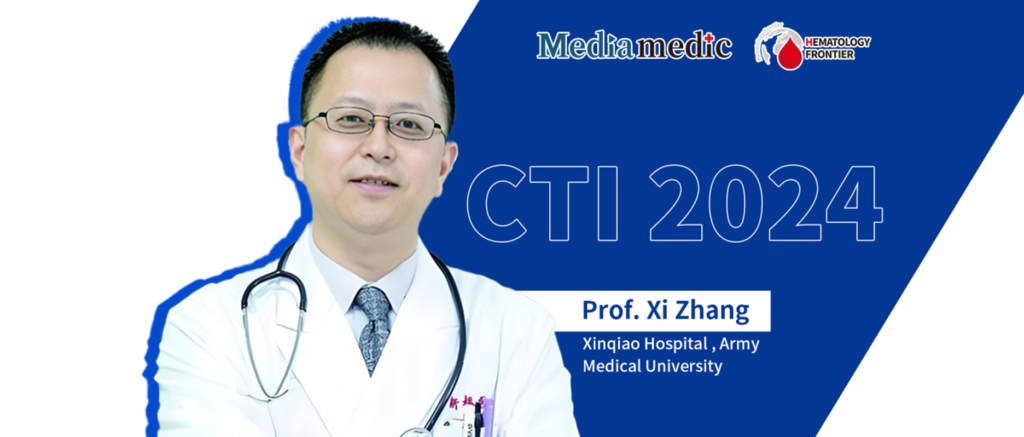
From November 14 to 17, 2024, the Cellular Therapy and Immunotherapy Conference (CTI) took place in Hangzhou, China, bringing together global leaders in cellular and immune therapies. This prestigious event served as a platform for academic exchange and a showcase for cutting-edge research in the field. During the conference, Prof. Xi Zhang from the Department of Hematology at Xinqiao Hospital , Army Medical University shared key insights on chronic graft-versus-host disease (cGVHD).Advances in cGVHD Diagnosis and Treatment
Hematology Frontier: Recent years have seen significant progress in the diagnosis, prevention, and treatment of GVHD. Could you elaborate on these advancements in the field of cGVHD?
Prof. Xi Zhang: Chronic GVHD (cGVHD) is a common complication following hematopoietic stem cell transplantation (HSCT) with a prolonged disease course. Historically, much of the focus in transplantation was on early complications like acute GVHD (aGVHD). However, with improvements in medical management, longer patient survival and reduced relapse rates have made cGVHD a critical issue requiring standardized treatment and research.
Patients now seek not just survival but also quality of life, which underscores the importance of cGVHD prevention and management.
Recent advancements include heightened awareness of cGVHD management, as reflected in the 2024 Chinese Consensus on cGVHD Diagnosis and Treatment, which emphasizes standardized care. Diagnostic innovations, including biomarkers and artificial intelligence, supplement the traditional NIH symptom-based criteria, enabling more precise evaluation and prognosis.
Preventive strategies have shifted from combined aGVHD and cGVHD prevention to targeted interventions. Notable advancements include the application of anti-thymocyte globulin (ATG), post-transplant cyclophosphamide, T-cell depletion techniques, and mesenchymal stem cell (MSC)-based approaches pioneered at Xinqiao Hospital.
In first-line treatment, corticosteroids remain the cornerstone. However, the emergence of novel T-cell and B-cell-targeting agents raises questions about their role in replacing or complementing steroids. Exploring such combinations could enhance outcomes.
For second-line treatment, innovative agents such as fasudil and low-dose methotrexate have shown promise, especially when tailored to specific organ involvement.
Challenges in cGVHD Treatment
Hematology Frontier: Your presentation at CTI 2024 highlighted challenges in cGVHD management. What are the main challenges, and how might they influence clinical practice?
Prof. Xi Zhang: The primary challenges in cGVHD treatment span four key areas:
- Precision Diagnosis: Traditional symptom-based diagnostics, while straightforward, lack foresight. Advances in biomarkers (e.g., autoantibodies, cytokine panels) enable stratification of patients likely to respond to steroids or requiring second-line therapy. These tools can also identify high-risk cases warranting aggressive interventions.
- Therapeutic Strategies: Optimizing corticosteroid use and integrating novel agents into first-line treatments remain priorities. Research is needed to clarify combination regimens and tapering protocols for second-line therapies, ensuring effective, patient-centered care.
- Refractory cGVHD: For patients unresponsive to conventional therapies, novel approaches are imperative. These include: Targeting new mechanisms: Drugs like pomalidomide and daratumumab show potential in refractory cases. Biologic therapies: Monoclonal antibodies such as anti-CD20, anti-IL-6, and balixafortide offer new options. Cell-based therapies: MSCs and endothelial progenitor cells (EPCs) hold promise for enhancing therapeutic efficacy.
- Quality of Life (QoL): Rehabilitation and patient-reported outcomes (PROs) are crucial. Findings from Xinqiao Hospital emphasize the disparity between physician and patient priorities, highlighting the need for personalized care plans. PROs tailored to Chinese cGVHD patients can provide actionable insights, bridging the gap between clinical outcomes and patient satisfaction.
Future Directions
Comprehensive strategies are essential for advancing cGVHD management, including precise diagnostics, innovative therapeutics, and personalized QoL improvements. Collaborative research and clinical trials will further enrich and refine treatment protocols, ultimately elevating the standard of care for cGVHD patients worldwide.
About Prof. Xi Zhang
Prof. Xi Zhang is the Director of the Hematology Department at Xinqiao Hospital, Army Medical University, and a renowned expert in hematopoietic stem cell transplantation. With over 142 SCI publications in journals such as JCO, Blood, and Lancet Hematology, he has significantly advanced the field. He is a distinguished researcher, holding leadership roles in several national and international hematology organizations, and has been recognized with numerous awards for his contributions to medical science and education.
Specializing in the clinical and basic research of “hematopoietic stem cell transplantation,” Professor Zhang Xi has led 52 projects, including key national stem cell R&D initiatives, major projects funded by the National Natural Science Foundation, military research projects, and Chongqing Natural Science Foundation key projects. He has published 142 SCI-indexed papers in prestigious journals such as JCO, JAMA Oncology, JHO, Blood, JCI, The Lancet Haematology, and Leukemia. He has authored three monographs as the chief editor and co-edited three additional volumes as deputy editor.
Professor Zhang has been the principal author of 12 industry guidelines and a contributor to 50 others. He has received numerous honors, including one National Science and Technology Progress Award (Second Prize), one Chinese Medical Science and Technology Award (First Prize), three Chongqing Science and Technology Progress Awards (First Prize), one Second Prize, three Military Medical/Scientific Achievement Awards (Second Prize), a Third Prize from the Chinese Anti-Cancer Association for Scientific Achievement, and a Third Prize for Outstanding Education and Research Achievement in Higher Education in Chongqing. He holds 68 approved national invention patents.
Currently, Professor Zhang serves as a standing member of the Hematology Branch of the Chinese Medical Association, Deputy Group Leader of the Hematopoietic Stem Cell Transplantation Section, a standing member of the Hematology Physician Branch of the Chinese Medical Doctor Association, Vice Chair of the Hematological Tumor Committee of the Chinese Anti-Cancer Association, Vice President of the China Hematological Disease Alliance, and a standing member of the Experimental Hematology Committee of the Chinese Society of Pathophysiology.
He is also the Editor-in-Chief of Blood & Genomics and a board member or reviewer for journals such as The Lancet, Nature Cell Biology, JHO, Leukemia, The Lancet Haematology, Science Bulletin, Chinese Medical Journal (CMJ), and Chinese Journal of Hematology.


